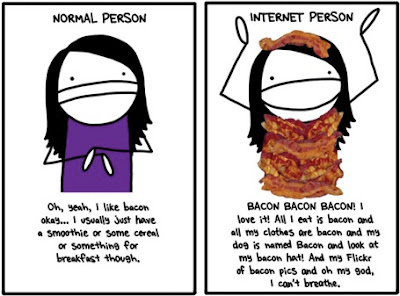For the past few months, I have been putting a lot of effort into something that started out with a bunch of silly jokes - as do most of the things I do. But this, unusually, has got me excited in a way that the feeling has persisted since last October and it is still making me delirious happy.
 |
| Tim |
Last year, as part of my degree, I did a module studying Short Film (and I got a first in it, which is a bit irrelevant, but made me super happy). Tim, a friend from the course, and I decided that it would be fun to make the films that we had written and had planned to write, rather than having just a bunch of short film scripts gathering digital dust once we had finished the semester. We also figured that this would be a good way of building up a creative portfolio before graduating from university, not only for us but for anyone else who wanted to get involved - other writers, directors, actors, editors, crew... We bounced the idea around some of the people on our course and they seemed to like it.
Then, one day, Tim and I showed up for a seminar that had been cancelled. Neither of us has received the email informing us of this, sent little more than an hour before the start of class while we were in different lessons. In a bit of a first-world-problem bitch fit (in which we bemoaned how much we were paying to be at university and still getting stood up), we decided that we did not need our teacher and were perfectly capable of writing and making short films by ourselves.
We were sort of right.
In that afternoon, we came up with a name, half a dozen potential script ideas, an email address, a Twitter account, a Facebook Members' Group and a Facebook Like page. In short, Tiny People Fabulous was born!
 |
| Terry the Toucan, the mascot of Tiny People Fabulous |
Over the next few weeks, the two of us met regularly to expand on this. We messaged people on our course asking if anyone else wanted to get their films made. We left link to our Facebook Members' Group on the message boards of various local and uni-based drama groups. We turned some of our script ideas into actual scripts.
As the weeks went on, people started noticing us and asked if they could get involved. There was a massive (but inevitable) imbalance in the favour of young actresses, so we spent an afternoon emailing anyone who looked valuable asking if they would like to get involved. Some of them did.
We started filming what was going to be our first short film shortly before Christmas of 2012. We had loads of issues from the beginning, but we had expected that we would and we approached them with the kind of optimism and eagerness typical of such newbies as us.
 |
| On set of the first film we shot! |
On the day of shooting, for instance, the heating went out in my house, so we had to fill a bath with water from the kettle. It took more than an hour. It was hilarious.
Somehow, miraculously, we got the whole of the film shot in one afternoon.
Then we had to delay the voice-over recording, which meant that the editing was also delayed, and we could not get the film finished by the deadline we had set for ourselves. We had hoped that we would be able to have at least one done before the end of the year.
We did not.
We have since been told that that deadline was wildly over-ambitious and that there was no way we could have done it without cutting some serious corners. So we chose to see our first fuck-up as a learning curve rather than a failure. This film is still not out, sadly, but it is very nearly finished, so it should be very soon!
We took a break over Christmas while everyone went home from university. I used the time I had free to get some scripts written and to do as much admin stuff as I could so that we could get right into creating when we got off our holidays. We began shooting another film (sadly also not yet edited) upon our return to London in January, which we had hoped to release before the end of the month to suit its theme.
 |
| One setback that has plagued us is our own silliness. I had to put Tim and Rianna in the naughty corner to stop them disturbing the process. |
Again, we have been advised that this was somewhat ambitious of us, and again we decided to learn from this.
We did not.
Around the end of January 2013, we planned and shot a film designed to be released by Valentines' Day. Needless to say, it was not.
 |
| Kim, director of "Pulled" |
We had all of the filming done well within our chosen deadline, but we had the same issues with editing as we did with the other films. We had very few editors and even less available technology, and we are still now sorting out putting it together. But being sorted out it is, and come together it will! It was an amazing experience making this film. Our director, Kim, was incredible and had such amazing and specific ideas - she knew what she wanted, and what she wanted was original and cool. She did great things with the script and made it very personal and very unique. We were lucky enough to be working with some devoted actors who pushed themselves to do new things for the sake of our art.
 |
| Dressing our beautiful leading lady on the set of "Pulled" |
For all of our films so far (excepting some uncomfortable friction with a temperamental director), I have worked with some incredible people, mostly students at university with me but not exclusively. Everyone has been gloriously dedicated and enthusiastic about everything; their attitude has made every process feel so much more exciting.
Working on a creative project personal to us with no other reason than that we wanted to was - and is - amazing. I have had so much fun with Tiny People Fabulous despite the setbacks that pretty much all of our projects so far have suffered. Keeping optimistic has been essential, but I think it is beginning to pay off.
Admittedly, our first film is short and silly - and so our most of the others we have planned for the future - but it is our silly film and it suits us perfectly! Tiny People Fabulous was born in silly circumstances (the first three or four film ideas we had were based purely on dick jokes of some description) and it would not have made sense to us to do any of it without a sense of fun.
Our first uploaded film, "Get Out Of My Room", is a great way, I think, of introducing Tiny People Fabulous to the world. Being based loosely on real life, it lets you all see what you're getting in for when you get into us - and unashamedly so.
We shot it in one absurd but efficient afternoon, edited it over the next few days and actually had the whole thing complete in about a week or so. It all went incredibly smooth and went pretty much how we had hoped the others would. It was a far simpler film to put together (with only one location and nothing as fancy even as voice-overs), and having both editors and technology freeing up right around the time we needed them certainly did not hurt the process.
 |
| Our modest editing crew |
We are very pleased with how it turned out and supremely grateful to everyone involved in making it, as well as everyone who has watched it already and offered us some feedback.
I am so looking forward to the next few weeks and the release of the rest of our films already in progress. I cannot wait to start shooting again because I have already had so much fun and worked with some incredible people. I can only see good things happening for Tiny People Fabulous.
 |
| On set of our very late January production. |
In the meantime, I can only offer a thousand of my most heartfelt thanks to everyone who has contributed even slightly to everything we have achieved so far and to offer this to the rest of the world...
Thanks!
 |
| Tim and I on set. We're definitely not messing around. |


























